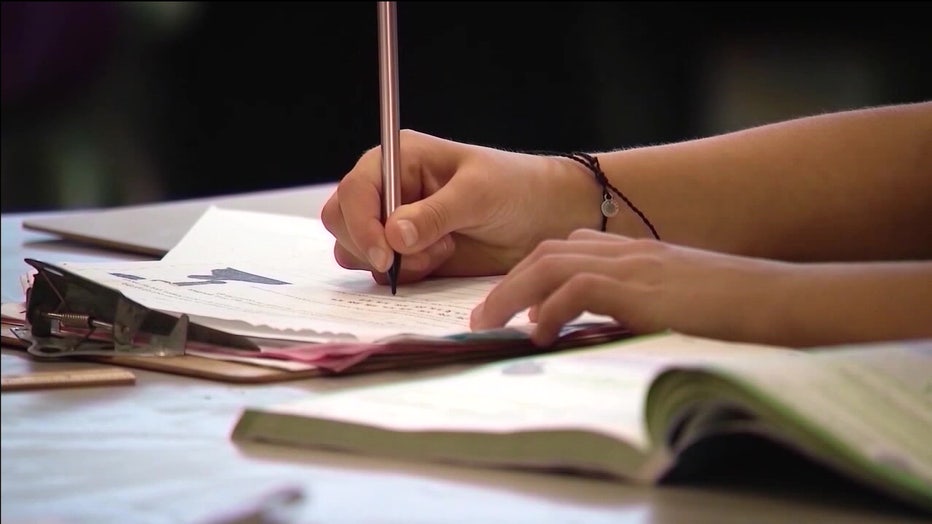College Board will release AP African American Studies framework on first day of Black History Month
TALLAHASSEE, Fla. - The College Board says it plans to release the framework for its pilot AP American Studies course on the first day of Black History Month after Florida officials rejected the curriculum and Gov. Ron Desantis made accusations that it aimed to indoctrinate students with ideologies not allowed in Florida schools.
The Florida Department of Education previously said in a letter that the content of the course was "contrary to Florida law" and lacked "educational value."
"This course on Black history, what’s one of the lessons about? Queer theory. Now, who would say that an important part of Black history is queer theory? That is somebody pushing an agenda," DeSantis said Monday.
Civil rights attorney Ben Crump is expected to announce Wednesday his intent to file a lawsuit against the governor for rejecting the AP course. His press conference is scheduled to take place in Tallahassee, alongside lawmakers and civil rights advocates.
PREVIOUS: Florida's rejection of AP Black history course stirs debate
Florida House Democratic Leader Fentrice Driskell called the administration’s rejection of the course "cowardly" and said it "sends a clear message that Black Americans’ history does not count in Florida."
"Imagine how boring and closed-minded we’d all be if we only met ideas that we agreed with," she said Monday.

Florida Gov. Ron DeSantis speaks at a press conference to announce the award of $100 million for beach recovery following Hurricanes Ian and Nicole in Daytona Beach Shores in Florida. The funding will support beach projects within 16 coastal counties
The College Board, after a decade of development, is testing the African American Studies course at 60 high schools nationwide. No school or state would be required to offer it after its scheduled rollout. Last week, they explained the new class is in a pilot phase and would update and revise the course as they work through the first year, just as they do with any new AP course.
The organization offers AP courses across the academic spectrum, including math, science, social studies, foreign languages, and fine arts. Taught at a college level, students who score high enough on the course’s final exam usually earn course credit at their university.
DeSantis gives answers to rejecting AP African American studies class
A rally is planned this week for people who want to speak out against Florida's decision to reject an AP African American studies course. Monday, Gov. Ron DeSantis gave examples of the lessons that didn't meet state standards.
The College Board has not said what revisions will be made, but plans to release the course's framework on Feb. 1 – the start of Black History Month – adding that should give the country a better idea of what is and isn't taught in the elective Advanced Placement class.
Bryan Griffin, Gov. DeSantis' press secretary, responded to the announcement in a tweet, calling it excellent news.
"The Florida Department of Education will review the changes for compliance once resubmitted."
School board to discuss classroom books controversy
In an effort to ensure compliance with Florida’s new school book rules, some Manatee County teachers say they’ve had to physically cover up or block access to classroom bookshelves.
READ: Censoring the school library? Manatee County officials to hold special meeting in battle over books
Florida education officials said they rejected the course because it violates legislation dubbed the Stop WOKE Act that DeSantis signed last year. It bars instruction that defines people as necessarily oppressed or privileged based on their race. At least some writers the course cites believe modern U.S. society endorses white supremacy while oppressing racial minorities, gays, and women.
The section on "Black Queer Studies" includes readings by Roderick Ferguson, a Yale University professor of women’s, gender and sexuality studies. The state says he "exclaims, ‘We have to encourage and develop practices whereby queerness isn’t a surrender to the status quo of race, class, gender and sexuality.’"
Ferguson said that quote comes from an interview he did about his book, "One-Dimensional Queer." The book, he said, is a discussion of "employment discrimination, laws against LGBTQ+ people, the suppression of progressive movements in the U.S., police violence against minority communities, restrictions on immigration (and) anti-black racism."
"These are real histories. The arguments about them are based on scholarly investigation and research — as are the arguments from the other scholars on this list," Ferguson said. "Unfortunately, we are in a moment in which right-wing forces are mobilizing to suppress the free discussion of those realities. If we need an example of that mobilization, we could probably just turn to the forces that came together to reject this course."
MORE: Critics plan rallies after DeSantis administration rejects AP African American studies course
The state calls out the course for including "Black Study, Black Struggle," a 2016 piece by UCLA history professor Robin D.G. Kelley, saying he "argues that activism, rather than the university system, is the catalyst for social transformation." Kelley called that description oversimplified.
His piece challenges student activists to move their efforts beyond campus and decries racism, inequality, capitalism, militarism and police brutality. But he also said activists must love everyone, "even those who may once have been our oppressors," and read and understand Western literature if they are to criticize it.

He said one point is "that we should not pay so much emphasis on trauma and victimization, but instead understand how we have fought for justice not just for Black people but for the whole nation (yes including struggling white people), despite the violence and oppression we have experienced."
The state also points out Kelley wrote the 1990 book "Hammer and Hoe," a history of communism in Alabama during the Great Depression of the 1930s.
"It won several awards and accolades, including from a few conservative anti-Communist historians, because it is based on thorough research — something DeSantis’s people are not familiar with," Kelley said.
The state criticized the inclusion of a section about "Movement for Black Lives," a coalition of more than 50 groups including Black Lives Matter and the National Conference of Black Lawyers. It says the group wants to abolish prisons and that it alleges there is a "war" against gay and transsexual Black people.
Governor DeSantis details education agenda or 2023
Governor Ron DeSantis is blasting teachers unions in his 2023 education agenda.
The state criticizes the section’s inclusion of a reading by Leslie Kay Jones, an assistant sociology professor at Rutgers University. It cites her quote, "Black people produce an unquantifiable amount of content for the same social media corporations that reproduce the white supremacist superstructure that suppresses us."
Jones said she found no indication that the Movement for Black Lives has ever advocated for prison abolition. She is surprised DeSantis’ staff attacked her for criticizing social media companies, as he does the same.
She said this is why students should have the ability "to come to their own conclusions through an evaluation of primary and secondary texts."
"Is Ron DeSantis claiming that Florida students are unable to formulate their own opinions?" she said.
The Associated Press contributed to this report

